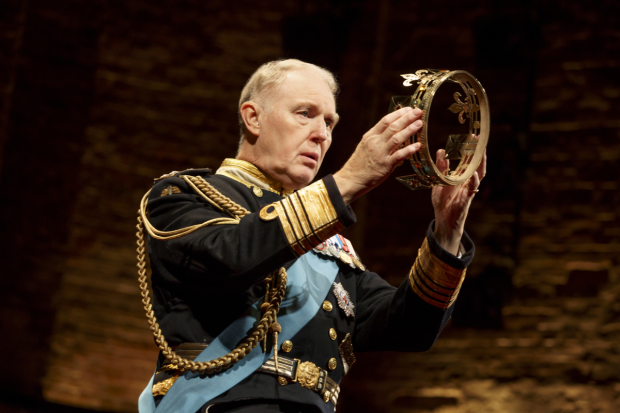King Charles III

(© Joan Marcus)
Is the term "future history play" an oxymoron? Perhaps, but it is an exhilarating oxymoron in the hands of Mike Bartlett. His new play, King Charles III (now making its U.S. debut at Broadway's Music Box Theatre following an acclaimed run in London), takes the form of a Shakespearean history, even though it is firmly set in the future: specifically, the first weeks of the reign of the current Prince of Wales. It's a bold experiment with form and content that pays off in delightful and unexpected ways.
The Queen is dead, to begin with. Her son, Charles (Tim Pigott-Smith), immediately ascends the throne. His wife, Camilla (a spot-on Margot Leicester), is ecstatic. Charles' older son, William (Oliver Chris), mourns his grandmother alongside his glamorous wife, Kate (a duchess made dangerous by the beautiful Lydia Wilson), who dreams of being queen herself. Meanwhile, younger son Harry (the perfectly cast Richard Goulding) is over this whole royalty thing; he meets an alluring young commoner named Jess (Tafline Steen) who shows him how the other 99.99 percent lives, much to the chagrin of the royal press secretary James Reiss (Miles Richardson, with a perfectly upturned nose).
During his first audience with Labour Prime Minister Evans (a harried and prickly Adam James), King Charles raises his objections to a new bill limiting press freedom in response to a series of phone hacking scandals. The PM thinks that Charles should love the bill as his family is a victim of these intrusions, but Charles believes that a fundamental liberty is at stake. The PM curtly lets Charles know that he doesn't care what he thinks, because the bill has passed both houses and his royal assent (the stamp of approval the monarch puts on all British legislation) is merely a formality.
Conservative opposition leader Stevens (a delightfully slippery Anthony Calf) suggests that the king could withhold assent (a drastic action not taken since the reign of Queen Anne, three centuries ago). The king agrees, turning what most had written off as a figurehead monarchy into a real political force. At the same time, average Britons begin to question whether they're living in a real democracy if an unelected King can veto legislation. It's an ominous start to Charles' reign, especially considering the fact that the first of his name was executed in 1649 for overstepping the bounds of his royal prerogative.
Bartlett's script echoes with legend from Britain's past and present. Although these characters are based on real people, they come with a public perception forged by the very press coverage the bill seeks to restrain. Bartlett extends our hazy notions of the royals to create dramatically compelling characters that reverberate through the Shakespearean canon: Charles is ineffectual like Richard II; Kate is a scheming and fashionable Lady Macbeth; Harry is our own latter-day Prince Hal. Just as Shakespeare did with history, Bartlett bends the truth about public figures and current events to fashion a thrilling contemporary mythology of Britain.
At the same time, Bartlett borrows liberally from Shakespearean form: "I've never heard you speak in such a way / With passion, strength and rhythm too," Camilla remarks after Harry delivers an emotional defense of Jess in iambic pentameter (he had hitherto only spoken in prose). Bartlett invents words like "Sloanish" and "Thatcherated" to fit perfectly in this meter. There's even a ghost (the spooky Sally Scott) to deliver unreliable prophecies.
Pigott-Smith leads the cast with the kind of overwrought intensity we've come to expect from tragic Shakespearean kings: Lear-like, he raves, "There is no common ground, no compromise. / Anointed not by man, but God, I don't / Negotiate but issue my commands." He wears his fear of losing himself to the office like an albatross, weighing down his increasingly ponderous gait.
Rupert Goold directs the production with simultaneous efficiency and grandeur. The scenes are staged on a raised platform in a semicircular playing space. The judgmental faces of the British public peer down from an ancient-looking fresco encircling the room (evocative scenic design by Tom Scutt). Jocelyn Pook's pulsating original music, a spine-tingling synthesis of old and new, underscores the important rituals of the play as well as key moments of dialogue (sound designer Paul Arditti adds the soundtrack in a seamlessly cinematic manner). Characters storm on and off stage in Goold's vigorous staging, creating an epic of the not-too-distant future.
Granted, this extrapolated form doesn't always translate to Bartlett's chosen subject: Kate's vaulting ambition doesn't make much sense in light of her repudiation of Charles for exercising his limited royal prerogative. She speaks of her desire for "power to achieve my will," but never elaborates on what that is. Similarly, Stevens (the closest thing this play has to a villain) never reveals his motives in soliloquy the way Edmund in Lear or Iago in Othello do. Rather, the perfidious Tory is offered (not unreasonably, just unsatisfyingly) as a given. What is unreasonable is the notion that the party of Jeremy Corbyn will form a government anytime in near future: We suspend our disbelief at the theater, but that's just a bridge too far.
Beyond that, King Charles III is unsettling in its proximity to reality: This is the actual governmental system of the United Kingdom. The Queen really does have to assent to every law. It's also not beyond the pale to imagine an exuberant European parliament seriously restricting a free press under the pretext of "privacy" (and then using that expanded power to cover up its own wrongdoing). Despite all that, republican sentiment in the U.K. remains remarkably low. Whether Bartlett's play becomes a prescient warning or a fanciful bit of Shakespearean fanfic remains to be seen as long as 89-year-old Elizabeth II persists as Britain's longest-reigning monarch. After that, all bets are off.










